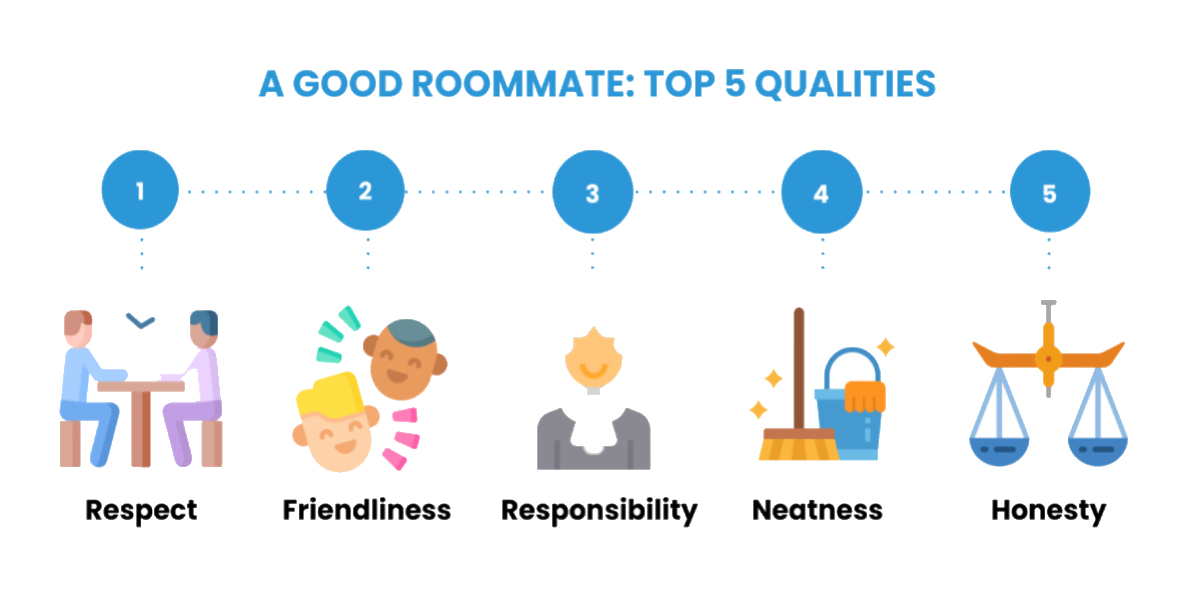Imagine if a complete stranger moved into your house. You would have to adapt to many changes, like sleeping in the same room, cooking in the same kitchen, and using the same bathroom. What if that stranger argued with you, or took some of your things without asking? That would be quite an unpleasant experience, wouldn’t it? Now, pause for a moment and consider that you will be a complete stranger to your future roommate. It’s always a good idea to see things from someone else’s perspective, especially if you have to coexist peacefully with that person for the entire school year.
Your relationship with your roommate should resemble a business partnership. In other words, don’t do anything you wouldn’t like your roommate to do. Share your obligations and respect each other’s privacy.
Living with a roommate in college can really brighten or darken your study years. This article is your survival guide to the world of strangers who can become your best friends or worst enemies. It’s important to remember that there are no inherently unfriendly people, but that a lack of compatibility and empathy can often lead to conflict.
🔝 What Makes a Good Roommate? Top 5 Qualities
To evaluate whether sharing a room with someone would be like a dream or a nightmare, look for the following qualities in that person: respect, friendliness, responsibility, neatness, and honesty. By the way, these traits can be helpful standards when looking for a friend or a partner, too.

👬 How to Be a Good Roommate: Best Tips
1. Roommates rarely become best friends. If it happens to you, consider yourself lucky indeed. However, try to avoid having extremely high expectations for your roommate. The idea is to room with someone who will not interfere with your studies, rest, and sleep.
If you and your best friend live apart, be grateful that you won’t be constantly distracted from your homework. Keep in mind that critical comments from people close to you (like besties) tend to be more hurtful than those from acquaintances. Since living together increases the probability of conflict, you will find that some relationships work better at a distance.
2. The first impression defines the success of your relationship. Positivity, openness, confidence, and a genuine interest in your future roommate are important qualities to practice as a freshman.
However, it is important to always be yourself. If you don’t enjoy loud parties or having visitors frequently stay over at your apartment, don’t pretend that you do. One day you’ll be tired of playing a role, and it could lead to serious disappointment for both you and your roommate.
3. Find a convenient time to clarify your expectations. Talk one-on-one with your roommate, making sure that both of you have the chance to discuss your daily habits. Start by asking your roommate how they envision sharing your common space and integrating your individual schedules. Favoring an open dialogue creates a safe environment to convey your expectations, and lets both of you know which issues require further discussion.
It’s also important to talk about your pet peeves, like using a bright light at night, listening to music without a headset, or setting multiple alarms at 6:30 a.m. Try to be polite while discussing these issues. Your goal is to share your thoughts as part of a friendly discussion. It’s a good idea to repeat these conversations every so often, since circumstances can change throughout the year.
4. Address issues before they grow into conflicts. When problems are small, they are easy to resolve. But if you constantly suppress your irritation, it could burst out at the worst possible moment.
The same is true with your college roommates. It is better to ask what’s wrong as soon as you notice that something is bothering them. In most situations, a compromise is easy to achieve before strong emotions come into play.
5. Be open-minded and flexible. Statistics indicate that 5.5 percent of the higher education population in the US are international students, and that number is growing. The chances are high that your roommate will come from a different country. Their culture, habits, and views may be in marked contrast to yours.
Prepare yourself for new experiences and resist the urge to criticize, at least during the first semester. As time passes, your differences will become less pronounced, as both of you adapt to each other’s lifestyles. After all, having new experiences and adopting new perspectives are two of the main reasons people go to college.
6. Coordinate your study habits. The dorm is not the only place to do homework, but overnight preparations for exams are inevitable. It is common for college students with different biorhythms to live in one room. If you are an early riser, you may wish to go to bed early and finish your studies in the morning. However, your roommate might only like to study at night. Opposing study styles can create discomfort for both of you and even become a trigger for conflict.
Reach an agreement on the use of lighting and the admissible level of noise. Avoid bringing friends to your room at hours when your roommate is sleeping. Lastly, empty out that crackling package of chips onto a plate.
7. Mind how often your friends come around. Your besties can be the most agreeable people in the world, but if they literally live in your room, nobody is going to like it. Here are some tips for maintaining happy friendships in the dorm.
First, always let your roommate know that someone is coming over for a visit, especially if that person will be there for over half an hour. Set rules for when any outsiders need to go home. Finally, if you have to break those rules at some point, ask your friend to bring a small gift for your roommate, so their irritation will be lessened.
8. Hygiene matters. Even if you’re not within hugging distance, unwashed T-shirts or socks will be noticed. There is also no need to explain that a daily shower is a must. As Nike promotes, “Just do it!”
In addition, sooner or later, one of you will catch the flu. When this happens, air out your room more often, and don’t let dirty tissues from your runny nose accumulate in the common space. Taking these necessary precautions will make you appear more considerate to your roommate.
9. Respect privacy. This is the most important rule of dorm etiquette, especially if your roommate is an introverted person. Both of you require some “alone time.” For instance, if they have a romantic partner, and you intend to spend the entire evening at the library, let them know about your plans. One day you will be in the same situation, and your effort will be appreciated in return.
Privacy is also about knowing the limits of another person’s property. Always ask before borrowing anything, and never look inside your roommate’s bags, wardrobe, or drawers.
10. The golden rule is to treat people as you want to be treated. No matter what happens, if you follow this rule, you can take comfort in the fact that you behaved thoughtfully and treated your roommate respectfully. Sometimes relationships don’t work out. Try to make sure that this doesn’t happen because of you.
Even if you have a bad experience with your roommate, you can walk away having learned some important lessons. Ironically, having a difficult roommate will make you a wiser person who knows all the “do’s and dont’s” of living with someone complicated. Alternatively, you can check our essays database for works that touch upon the topic of dealing with roommates and gain some valuable knowledge.
😕 Typical Roommate Problems & How to Handle Them
Living in a dorm is a much more cost-effective approach to your college years than living alone. However, sharing a room with a stranger, who probably has a different background and unfamiliar habits, can make it difficult to create a harmonious roommate relationship. Conflicts will be inevitable in one or several of the following areas:
- Disrespect (in words or actions)
- Frequent guest visits, overstaying curfews
- Partying
- Borrowing or stealing
- Differences in studying styles
- Sleep schedule issues
- Different standards of cleanliness
- Hygiene problems
- Privacy issues
- Being loud (long telephone talks, etc.)
- Differences in temperament
Your level of stress defines how successful you are in your studies. When your stress level is low, there are fewer obstacles to working hard and studying well. However, excessive amounts of stress can worsen your grades, as this study shows. Your room should be a place where you can rest and relax. Having a positive, comfortable relationship with your roommate is vital for creating a successful study environment. Keep in mind the following advice for detecting and handling problems early on.
- Unhealthy reactions bring about the worst outcome. First, if you consent to everything the other person wants, you will most likely become passive-aggressive at some point. Your roommate might not understand your reaction, especially if you were accommodating before. However, refusing to compromise or ignoring all conflicts is not a good approach either. A tense atmosphere in your room generates as much stress as quarrels do.
- Make a roommate contract. It could sound weird, but in a couple of months, you will probably understand why you need one. If you don’t agree on any rules, both of you can act however you like, which will definitely lead to conflict. Suggest writing a contract together as a fun activity, like team building. The contract is a preventative measure to handle both trivial and important issues that you might not anticipate at the beginning of the year.
- Notice the early signs. Quarrels do not appear out of nowhere. A good roommate is one that notices when something is wrong and tries to reach a compromise. However, don’t assume that you are always the cause of your roommate’s bad moods. Overthinking your role can cause anxiety and draw out the problem. As soon as you are aware that the situation has become tense, move on to the next point.
- If you sense their discomfort, ask what’s wrong. If you know the cause of the tension, you can discuss what can be done to make your room a better place to live for both of you. Appeal to your roommate’s logic: conflicts hurt all people involved, even if it appears as a wave of silent anger. Invite them to talk to you and demonstrate that you respect their feelings. This sort of discussion should take place in person. Social media is not a good place for conflict resolution.
- Look for a mediator. A peer can help, but an RA (Resident Assistant) or a professor is a better option. Tell the third party what you expect them to do and briefly explain the background of the conflict. Moreover, the presence of a mediator will discourage you from saying hurtful things, which you could regret later on. During mediation, you will have a chance to look at the situation from a new point of view. Very often, a different perspective is helpful in itself.
- Understand your style of conflict resolution. People who tend to avoid stressful situations opt for a compromise more often than those who are ready for an open confrontation. This knowledge will come in handy when trying to understand your roommate’s motives. Sometimes, a straightforward discussion is more effective. In other cases, a mediator is useful to limit the possibility of offensive behavior.
- Trying to be best friends will do more harm than good. Do not worry about becoming besties with your college roommate. People tend to think that common interests, joint experiences, and like-mindedness make relationships warmer. This can be true, but sometimes distance and prudence are the best ways to interact. Build your communication on respect, not affection.
- Changing rooms is the last resort. Choosing to start from scratch is a silent confirmation of poor problem-solving skills. There are situations when life with a specific roommate becomes unbearable. However, in most cases, your new roomie will have their own hot-button issues, so it’s six of one and half a dozen of another. Develop your communication skills and remember that we are irritated most by the traits that reside in ourselves.
🛏️ Living on Campus: What to Expect
The most significant drawback of life on campus is that you can’t choose your roommate. However, there is still some good news. Most accommodations are assigned to students for one year only. That is to say, in a year, you will have to face the same issue: how to coexist peacefully with a complete stranger. So try to make the most out of the relationships you are currently in.
In most cases, the choice of roommates is not random. Colleges use a housing questionnaire to match relatively similar people. You will be asked when you go to bed and wake up, whether or not you smoke, how often you use alcohol, etc. Some schools even ask you about your preferences in music, reading, and movies. There’s a chance you might actually share many traits and interests with your new roommate.
An important question that requires a sincere answer is whether or not you value neatness. If you say yes, your roommate will most likely care about tidiness, too. However, a dishonest reply can create continuous conflicts about who is going to clean the room and when. People who share similar ideas of a comfortable level of cleanliness are usually better at sharing housework obligations.

Colleges usually try to match people from different geographical origins, which offers a great opportunity to learn something new, without having to move to another country or state. Your cultural differences can form the basis for your reciprocal interest and inquisitiveness.
In fact, the need to adjust to a complete stranger has its positive side. Your life in college is dedicated to obtaining new skills, including social ones. Try to view your life on campus as another opportunity for self-development. By the way, the success of these relationships can predict the level of your social skills at work. You need to work on them to know what to expect for yourself.
Another positive feature of living on campus is the availability of a Resident Assistant. An RA can mediate conflicts and offer help in critical situations. These people are usually upperclassmen (although some schools hire professionals). A senior student can often offer better advice for a new student’s stressful situation even better than an adult can.
How Can I Change Roommates?
Sometimes relationships don’t work out. You may have different views on cleanliness, conflicting sleeping schedules, or even disagreements over your tastes in music. These issues can be resolved if both of you are open to compromise. If not, the only way out is to change roommates.
Be sure to tell your roommate about your intention. Sometimes, it helps lessen the tension. If it doesn’t, talk to your RA about the situation. Most likely, they will talk to both of you and try to find a more peaceful solution. If your roommate is psychologically or physically abusive, do not hesitate to request changing your situation. In milder cases, you will need to bring your request to the school’s administrator.
🛋️ Living off-Campus: How to Pick the Right Roommate
Picking your roommate is one of the most valuable benefits of living off-campus. This way, you don’t have to live with strangers. In fact, most students share their apartments with romantic partners, relatives, friends, or acquaintances. Still, some people choose to look for a roommate online for economic or social reasons. Living with someone new is an ideal way to develop your social skills, so don’t feel bad if you don’t have any friends studying in your city.

But before you and your friend move in together, take time to consider whether your relationship will be improved or harmed by the intensified communication that comes with living together. Even though you might know your future roommate from school, if you haven’t lived with them before, it is very difficult to predict how they will respond to conflict. People act differently at home: they neglect their hygiene and ignore their messes, or they terrorize everyone with scrupulous neatness. When friends live together, they tend to lose discretion and overstep boundaries. For this reason, you should consider the following questions before deciding to live with your friend.
- Are they responsible enough for you to trust them? Will they remember to lock the door, or pay the rent on time?
- Are they organized enough to keep the apartment in order? You can find the most honest answer by visiting where they currently live. Your shared apartment will look the same way as their room looks now.
- Do you feel respected when you deal with them? If you have a chance, look at how they treat their family. Their behavior will reveal their home communication style, which you could be part of soon.
- Ask them about their schedules. This question is essential if you will live in the same room, a studio, or a one-room apartment. Certainly, compromises can always be reached, but you should know what to expect.
- If it makes a difference to you, do they smoke or drink?
- Are they going to arrange parties at home? What friends are they going to invite, and how often? Consider whether you will feel safe when their acquaintances come around.
- Do you have shared interests? Even if you spend all day studying or working, you will still end up talking to each other once in a while. Comfortable communication can define the feeling of a home in general.
- Do your temperaments match? This issue is complicated, both abstractly and practically, but the key is to know whether or not you will quarrel every day for trivial issues.
What to Do if I Can’t Make it Work?
Firstly, always remember that many issues can be resolved with a timely conversation. Let your roommate know what is bothering you, and try to be careful about selecting the right words. If you see that there is no way to reach an acceptable compromise, suggest moving to another apartment or finding a new roommate. If both of you decide to look for a new place to live, you’ll have to talk to the landlord about breaking the lease. In the case of early lease termination, your security payment is usually not returned.
Talk to the landlord about your situation honestly. Moving out without informing them could entail a lawsuit against you and a negative credit score, which would affect your future ability to rent an apartment. If your landlord is not accommodating, or if you can’t afford to break the lease, or if you can’t find a new roommate, consider staying. Next time, you will be more experienced in selecting the right person to live with.
🔗 References
- Roommates – Campus Life | University Of Cincinnati
- Getting a New Roommate | Student Life: Campus Services
- Find a Roommate: Off-Campus Life – Northwestern University
- Roommates | Housing & Residential Life
- Living With A Roommate: How To Make It Work – Forbes
- The Rise of Roommate Households – The Atlantic
- Rules for Living with Roommates | The New Yorker
- College Roommates: The Basics – BigFuture – College Board
- How to Get Along With Roommates in Your Apartment: 5 Steps
- Getting Along with Your College Roommate – Psych Central




I really could’ve used these with my first college roommate! It’s such a huge change that’s unlike anything you’ve ever experienced before, and it’s so easy to butt heads and encroach on one another’s space. I wish I would’ve had an open and honest discussion with my roommate at the beginning of the year!
Thank you for sharing your thoughts, Kalin! Your opinion is very important for us!